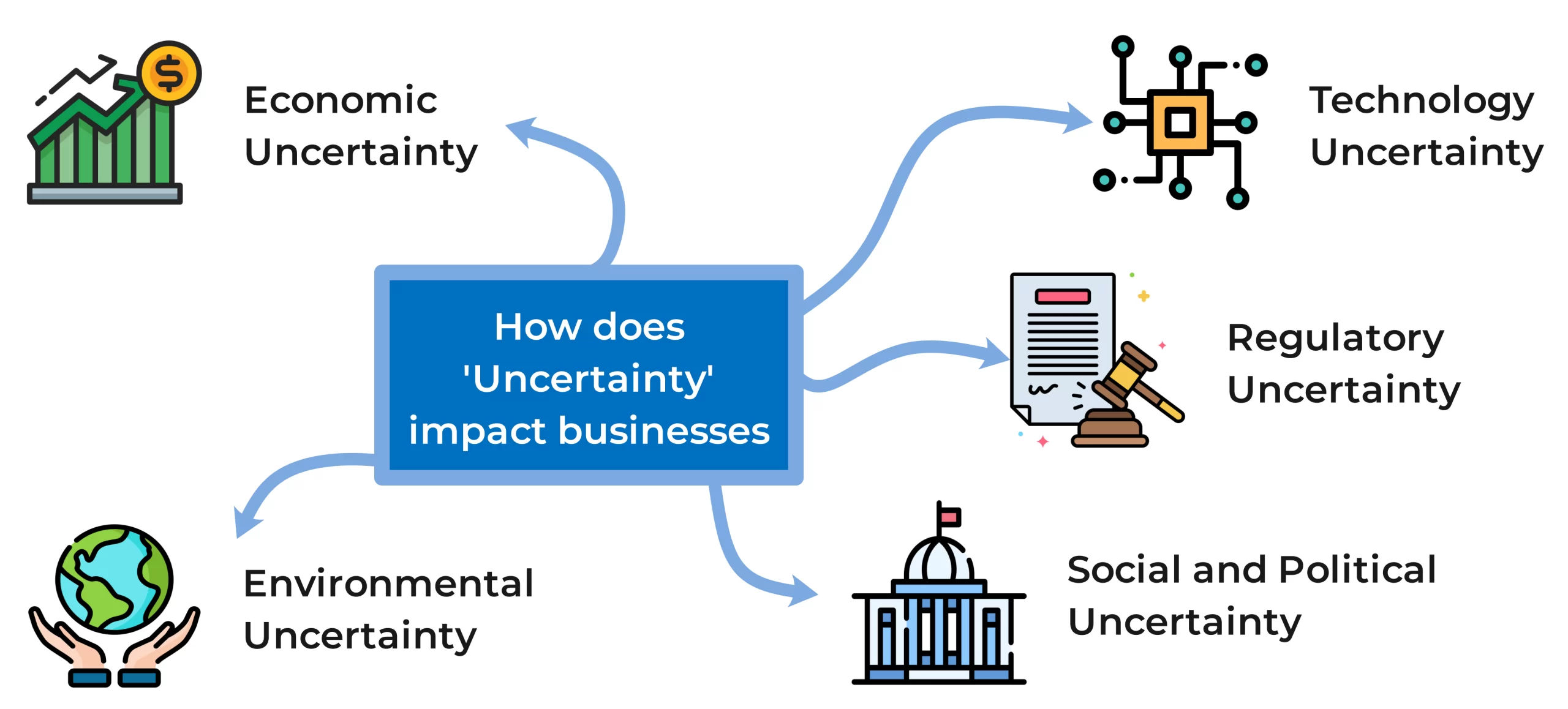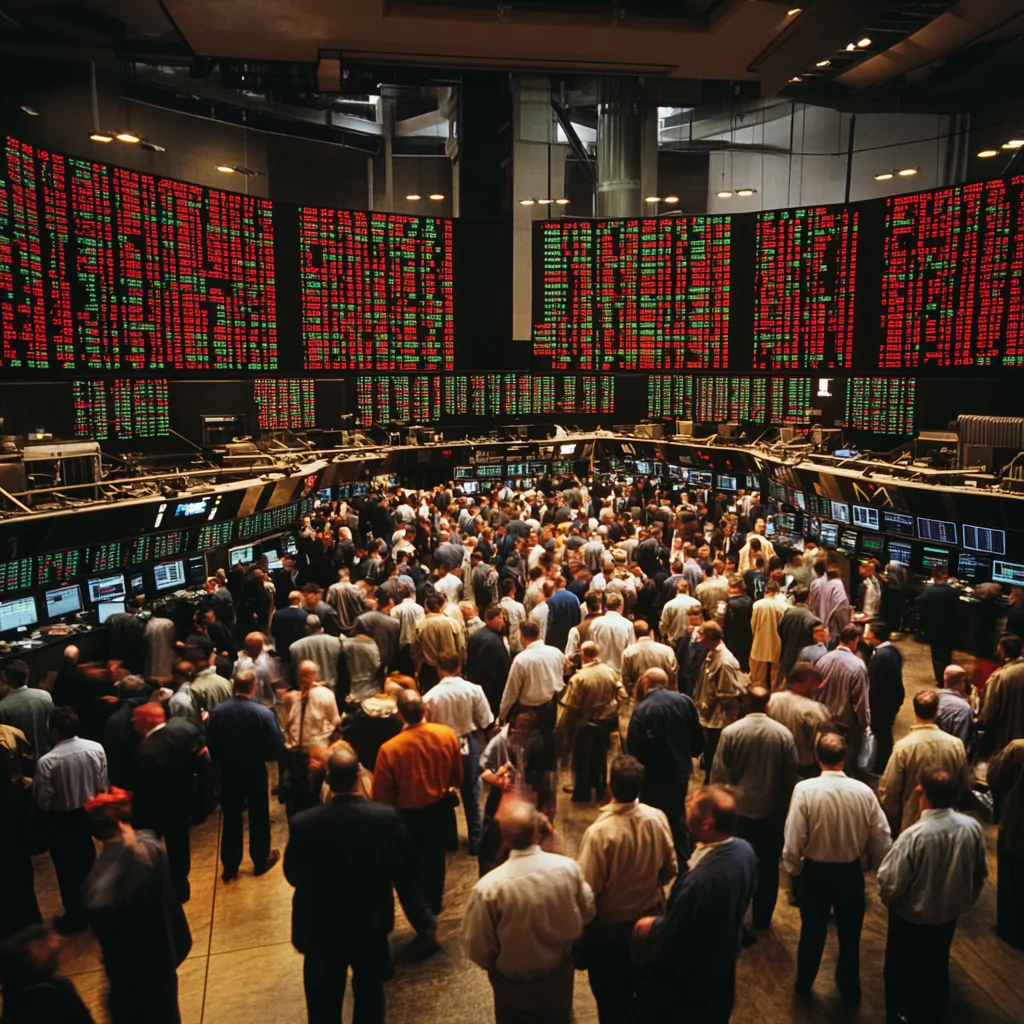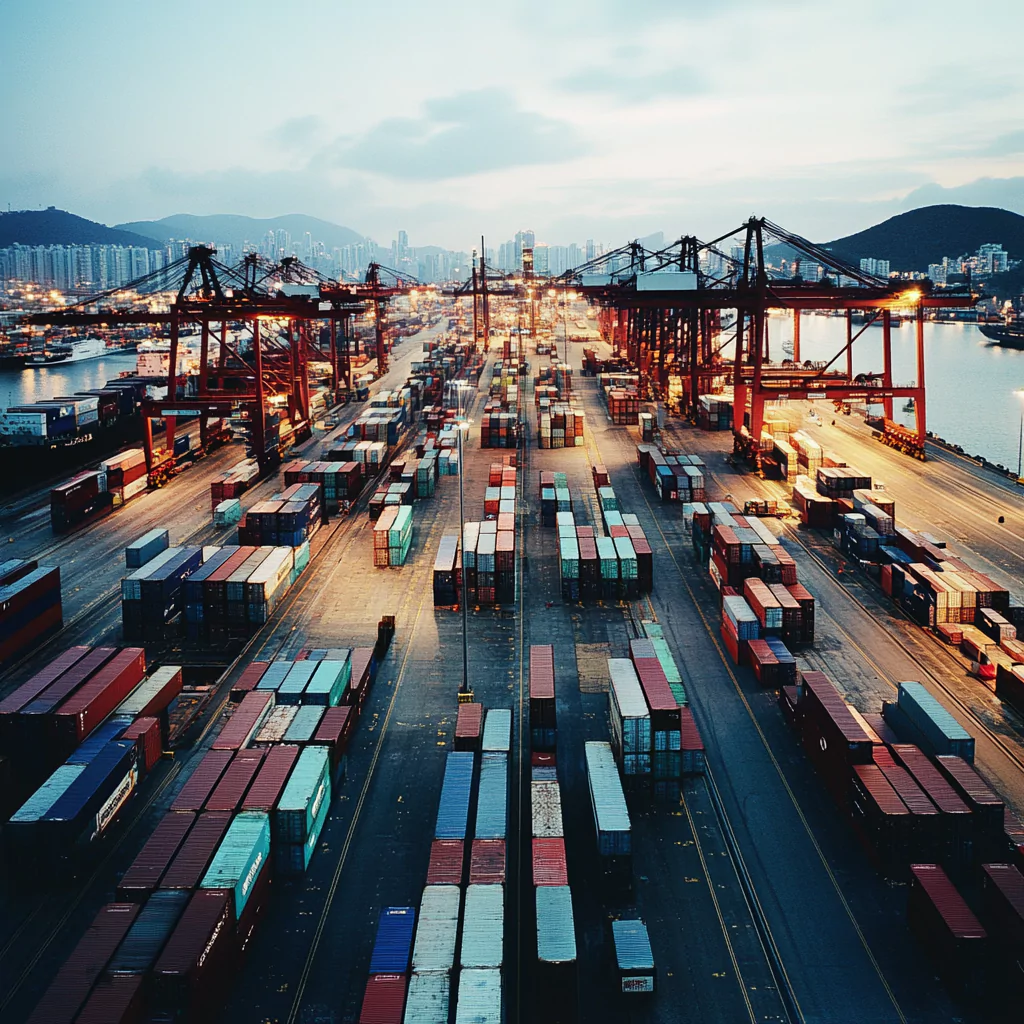Episode 1 - Navigating Uncertainty
What does uncertainty mean for businesses?
Episode 1 - Navigating Uncertainty
1.1 What does uncertainty mean for businesses?
The only thing that is constant in this world is 'change'. Change is an agent that forces us to adapt or perish. Businesses are no exception to this factor. But the most important question is"
What happens when change is very frequent?
It can be very frustrating, annoying and it challenges you to throw away the accepted know-how and to re-invent yourself to move into the future. But when situations are very volatile and the rate of change is super frequent, what are the principles, strategics and hacks you would follow in your business? How can we harness technology to help make sense of things in a very volatile and uncertain environment?

1.2 Uncertainty = Unpredictability
If you really think about 'uncertainty' and what is means, it's all about not being able to predict what is happening now or what will happen in the future. But if you really look at things on the grand scheme of things, it was uncertain all along.
What gave you the confidence to move forward was
You had data to make better informed decisions - Maybe you experienced something similar in the past and managed to successfully navigate the situation or you have really strong measure-monitoring metrics in your business which alert you when things aren't acting the way it's supposed to giving you ample time to turnaround or mitigate the impact.
You had the right resources - Having the right resources and also a great resource allocation structure in your business enabled you to navigate the turbulent waters with confidence. This includes the right set of skills, financials, technology, raw materials, supply chain network and infrastructure.
You had the right agile systems and processes in place - Having the right systems and processes in place helps your business to function smoothly no matter how chaotic and turbulent the external environment is. If the processes and systems are designed in a way that enables the business to rapidly respond to the shifts in the marketplace and other related factors, there is a greater chance that the business will be able to navigate the waters with confidence.
You had clear effective communication - You communicated in a clear and open manner to the relevant stakeholders which includes employees, customers and stakeholders of your business.

Figure 1 - Key Drivers of Navigating Uncertainty
Now let's look at how 'uncertainty' impact businesses.
1.3 How does 'Uncertainty' impact businesses?
Uncertainty can impact businesses in many ways, and it boils down to 5 main categories.

Figure 2 - Ways which uncertainty impacts businesses
Economic Uncertainty - This is when unpredictable changes such as a recession or sudden inflation happen in the economy. For example, the 2007-2008 Financial downturn and the Post-Covid-19 Inflation which many countries experienced can be identified as periods of Economic Uncertainty.
Technological Uncertainty -This is when new technologies such as Artificial Intelligence, Robotics and Drones are developed rapidly, which can either disrupt industries or make existing products or services outdated forcing businesses to constantly adapt to remain competitive. For example, taxi companies lost their market share to ride sharing apps such Uber (2019), Lyft (2012) and Bolt (2013); the rapid adaption of Generative AI services such as ChatGPT, RunwayML and Midjourney is impacting the livelihoods of copywriters, photographers and videographers.
Regulatory Uncertainty -This occurs when laws and regulations change unexpectedly, such as new taxes and tariffs, environmental rules which can affect how businesses operate. For example, USA imposed tariff increased the tariff on Chinese imports including electric vehicles (ECs) by 100%, solar panels by 50% and semiconductors by 50% [1]; the European Union (EU) introduced the 'Carbon Boarder Adjustment Mechanism (CBAM)' [2] which is a system to impose CO2 tariffs on imported steel, cement, aluminium, iron, steel and other goods.
Social and Political Uncertainty - This refers to changes in society or government, like shifts in consumer behaviour or political instability which can impact a business's market or operations. For example, the 2024 - Bangladesh July Revolution and the 2022 - Protests in Sri Lanka - 'Aragalaya' | 'අරගලය'.
Environmental Uncertainty - This involves unpredictable changes in the environment, such as extreme weather or natural disasters such as hurricanes, floods, wildfires, earthquakes and tsunamis, that can disrupt supply chains, production, or even threaten the business's physical assets.
Now, let's explore each of the above types of uncertainties and the impact it has on businesses.
1.3.1 How does 'Economic Uncertainty' impact businesses?
Economic Uncertainty can be identified as the unpredictability and instability in the economy that can arise from a variety of factors such as change in government policies, fluctuations in market conditions, inflation, interest rate shifts, geopolitical events such as Russia-Ukraine war, China-Taiwan tensions, USA-China tensions or financial crises.
So, what is the impact of Economic Uncertainty on businesses?
Reduced Investment and Expansion - When businesses are unsure of the future, they may delay or reduce their investments in new projects, technology, or expansion. As companies prefer to hold on to their cash reserves rather than take on new risks, this cautious approach can slow down growth and innovation.
Market Volatility and Revenue Fluctuations- Economic uncertainty often leads to volatility in financial markets, which can cause sudden changes in consumer demand. This creates an effect where business experience unpredictable revenue streams, making it harder to plan and budget effectively.
Cost Management Challenges - Business will experience increased costs due to inflation, rising interest rates, or supply chain disruptions. This can reduce profit margins, forcing companies to find ways to cut expenses which often include layoffs or scaling back operations.


- Access to Financing - During periods of economic uncertainty, banks and investors may become more risk-averse, making it harder for businesses to secure loans or investment capital. This can limit their ability fund operations, invest in growth, or cover short-term cash flow needs.
- Consumer Confidence and Spending - Economic uncertainty can lead to reduced consumer confidence, causing people to cut back on spending. This decline in consumer demand can negatively impact sales, particularly for businesses that rely on discretionary spending.
- Supply Chain Disruptions - Unpredictable economic conditions can disrupt global supply chains, leading to delays, shortages, or increased costs for raw materials and goods. Businesses may need to find alternative suppliers or adjust their production schedules, which can be both costly and time-consuming. This was evident during the 'Covid-19 Pandemic' [3].
1.3.2 How does 'Technological Uncertainty' impact businesses?
Technological Uncertaintyis the unpredictability surrounding the development, adoption, and impact of new technologies. It occurs when businesses face uncertainty about which technologies will become dominant, how fast they will evolve, and what disruptions they might cause in industries and markets. This makes it challenging for companies to decide when and how to invest in new technologies or adjust their business models accordingly. For example, the evolution of Generative Artificial Intelligence (GenAI) is creating chaos in the workforce as the implications cannot be anticipated due to the dynamic and evolving nature of the technology.
So, what is the impact of Technological Uncertainty on businesses?
- Obsolescence of Products and Services - Rapid technological advancements can make existing products or services outdated. Companies that don’t keep up with new developments risk losing market share as competitors adopt newer, more efficient technologies. For example, Blockbuster loss to Netflix and the story of Kodak are classic example where giant companies had the right tools and even the technology to innovation and change the game but a combination of factors resulted their downfall.
- Uncertain ROI on Technology Investments - Businesses may be hesitant to invest in new technologies because of the uncertainty surrounding their long-term value. The fear of choosing the wrong technology or failing to see a return on investment (ROI) can delay critical upgrades or innovations. For example, even though technologies such Blockchain promises to deliver a tamper-proof method for storing data, businesses are reluctant to invest in it as the ROI is uncertain due to the novelty of the technology.


- Increased Competition - Technological breakthroughs often open the door for new competitors, including startups and disruptors, who leverage these advancements to provide better, faster, or cheaper alternatives. Established businesses may struggle to keep pace with these agile newcomers.
- High Cost of Adoption - Implementing new technologies can require significant financial investment in infrastructure, training, and integration. Businesses may face unexpected costs related to upgrading systems, maintaining new technologies, or retraining staff to effectively use them. For example, small businesses might struggle to implement advanced technologies such as Robotics and Automation to optimize their business processes.
Disrupted Business Models - Entire business models can be disrupted by technological uncertainty. For example, digital platforms have transformed industries like retail, media, and transportation, forcing companies to rethink how they deliver value to customers and adapt their operations. For example, e-commerce giants such as Amazon and E-Bay have transformed the way we shop.
- Cybersecurity Risks - With the adoption of new technologies, especially in areas like cloud computing, AI, and IoT, businesses also face heightened cybersecurity risks. Uncertainty about the vulnerabilities of new systems can lead to increased exposure to cyber threats.
- Decision Paralysis - The overwhelming number of technological options can create "decision paralysis," where businesses struggle to choose the right technology, slowing down progress and causing missed opportunities for growth or improvement.
1.3.3 How does 'Regulatory Uncertainty' impact businesses?
Regulatory Uncertaintyrefers to the lack of clarity or unpredictability surrounding laws, regulations, and government policies that impact businesses. It arises when businesses are unsure about current or future regulations, making it difficult to plan, invest, or operate confidently. Regulatory uncertainty can occur due to political shifts, new laws, policy changes, or inconsistent enforcement of regulations across regions.
So, what is the impact of Regulatory Uncertainty on businesses?
- Delayed Investment and Expansion - Businesses may postpone or cancel investment decisions if they are unsure about upcoming regulatory changes. This hesitation stems from fear that new laws could make certain projects more expensive or unviable. For example, companies in the Energy Sector often delay investment in renewable energy projects due to uncertainty about government policies on carbon pricing or subsidies for 'Green Energy' and the US-China Trade War which resulted in the imposition of tariffs and unpredictable shifts in trade policy between two of the largest economies in the world.
Increased Compliance Costs - Regulatory uncertainty can lead to higher costs as businesses must invest more resources in compliance efforts. Constantly shifting rules require companies to update their practices, train staff, and potentially overhaul systems. For example, the financial services industry faced rising compliance costs in the wake of the 2008 financial crisis as regulators introduced new rules such as Dodd-Frank (prevents the excessive risk-taking that led to the financial crisis. The law also provides common-sense protections for American families, creating new consumer watchdog to prevent mortgage companies and pay-day lenders from exploiting consumers.) but ongoing uncertainty about how these laws would be enforced added complexity.


- Risk of Legal Penalties - Businesses may face legal risks if they fail to comply with new regulations, especially when rules are unclear, or enforcement is inconsistent. Even when companies try to comply, they can still be penalized if they interpret vague regulations incorrectly. For example, Technology companies dealing with data privacy laws, such as Europe’s General Data Protection Regulation (GDPR), face hefty fines if they are found in violation of these complex regulations, even when rules are ambiguous.
- Reduced Innovation and Market Entry - Regulatory uncertainty can discourage innovation and market entry. Startups or established companies may avoid launching new products or entering new markets if they fear sudden regulatory changes that could increase costs or block the product’s success. For example, in the pharmaceutical industry, uncertainty around drug approval processes and regulations in different countries can discourage firms from investing in new drug development or expanding into foreign markets. If we look at the Covid-19 Pandemic, the drug approval process was fast tracked to accommodate innovation in vaccination and other drugs to stop the pandemic.
- Inconsistent Regional Regulations - Businesses that operate in multiple regions or countries face additional challenges when regulations vary from one jurisdiction to another. Regulatory uncertainty in one region can disrupt global operations, especially when businesses are unsure how local laws will align with broader regulatory frameworks. For example, the ride-sharing company Uber has faced regulatory uncertainty worldwide. In some countries, regulations regarding ride-hailing services are unclear or frequently changing, leading to legal battles and uncertainty about how the company can operate.
1.3.4 How does 'Social and Political Uncertainty' impact businesses?
Social and Political Uncertaintyrefers to unpredictable changes in societal trends, public behavior, or cultural attitudes that can affect consumer preferences and business operations. Political uncertainty involves instability or unpredictability in government policies, political environments, and leadership, which can lead to changes in regulations, trade agreements, or business-friendly policies. These uncertainties make it difficult for businesses to plan and operate with confidence.
So, what is the impact of Social and Political Uncertainty on businesses?

- Shifts in Consumer Behaviour - Social uncertainty, such as changes in public attitudes or economic conditions, can lead to shifts in consumer preferences and spending habits. This can disrupt demand for certain products or services and force businesses to quickly adapt their offerings. For example, during the COVID-19 pandemic, the shift toward remote work and digital solutions altered consumer behavior, with increased demand for e-commerce, online services, and home office equipment. Zoom Video Communications annual revenue grew from USD $ 0.3 billion (2019) to USD $ 4.1 billion (2022) during the Covid-19 Pandemic. (Source: Zoom)
- Policy and Regulation Changes - Political uncertainty, such as elections, government changes, or geopolitical tensions, can result in sudden shifts in regulations, trade agreements, or tax policies. This makes it difficult for businesses to predict how government actions will affect their operations or profitability. For example, during Brexit (2016 - 2020), businesses in the UK and EU faced political uncertainty around trade agreements, customs regulations, and tariffs. Companies were unsure how Brexit would affect their supply chains, workforce mobility, and market access, leading to delayed investments and disruptions.
- Increased Risk and Cost of Doing Business - Political instability or social unrest can increase the risks associated with doing business, such as higher security costs, disrupted operations, or limited access to markets. Businesses may need to spend more on risk management, insurance, or relocation of facilities. For example, the Arab Spring in 2011 led to significant political instability in the Middle East and North Africa, disrupting supply chains, trade routes, and investments in countries like Egypt, Libya, and Syria.
- Delayed Decision-Making and Investments - In times of political or social uncertainty, businesses tend to delay important decisions related to expansion, investment, or hiring. This caution is driven by the fear that political shifts or social changes may impact the business environment unfavorably. For example, many global businesses held off on investments in Catalonia, Spain, during the 2017 independence referendum crisis. The political uncertainty surrounding Catalonia’s potential separation from Spain created fears of economic instability, possible regulatory changes, and market fragmentation.

1.3.5 How does 'Environmental Uncertainty' impact businesses?
Environmental Uncertaintycan be defined as the unpredictable changes in the natural environment that can impact businesses, such as climate change, natural disasters, extreme weather events, and resource shortages. It also includes regulatory and market responses to environmental issues, such as new sustainability laws or consumer demand for eco-friendly products. These uncertainties create challenges for businesses in terms of planning, operations, and long-term sustainability.
So, what is the impact of Environmental Uncertainty on businesses?
- Supply Chain Disruptions - Environmental events like floods, hurricanes, or droughts can disrupt supply chains by delaying the transportation of goods or damaging infrastructure. For example, the 2011 floods in Thailand severely impacted global supply chains, particularly for the automotive and electronics industries. The floods caused significant disruptions to production and supply, affecting companies like Toyota and Western Digital, which faced shortages of parts.
Increased Operating Costs - Businesses may face higher operating costs due to environmental regulations, rising energy prices, or the need to invest in eco-friendly technologies. For instance, companies must often spend more to comply with stricter environmental standards or to adopt sustainable practices. For example, many companies in the European Union faced increased costs when the EU introduced stricter carbon emission regulations. Industries like manufacturing and aviation had to invest in cleaner technologies and offset carbon emissions, raising operational expenses.


Risk of Resource Shortages - Environmental changes can lead to shortages of key natural resources, such as water, energy, or raw materials. Businesses that rely heavily on these resources may face production slowdowns, increased costs, or even the inability to continue operations. For example, Coca-Cola faced water shortages in India due to droughts and increasing competition for water resources. The company was forced to close several bottling plants, which impacted production and highlighted the vulnerability of businesses reliant on scarce natural resources [5].
Damage to Infrastructure and Assets - Extreme weather events such as hurricanes, floods, and wildfires can cause physical damage to infrastructure, facilities, and equipment. This results in costly repairs and downtime, potentially halting production and affecting revenues. For example, in 2017, Hurricane Harveycaused widespread damage in Texas, shutting down oil refineries and chemical plants along the Gulf Coast. The disruption resulted in billions of dollars in damages and reduced oil production, which affected the entire supply chain.
Changing Consumer Preferences - As environmental concerns grow, consumers are increasingly demanding sustainable and eco-friendly products. Businesses that fail to adapt to this shift risk losing market share to competitors that prioritize sustainability. For example, Fast fashion brands like H&M and Zarafaced criticism for their environmental impact in the past, leading to a shift in consumer preferences toward sustainable fashion. Companies like Patagoniaand Everlane, which emphasize eco-friendly practices, gained popularity as more consumers opted for sustainable clothing.
Regulatory and Compliance Pressures - Governments are increasingly implementing stricter environmental regulations to combat climate change, requiring businesses to reduce their carbon footprints, use cleaner energy, or adopt sustainable practices. These regulations can increase compliance costs and force businesses to alter their operations. For example, in 2021, the European Union implemented the European Green Deal, which aims to make the EU climate-neutral by 2050. Companies across industries are now required to reduce emissions, invest in green technologies, and meet stricter environmental standards, increasing costs for compliance and infrastructure changes.

Reputation Risk and Market Positioning - Businesses that fail to take proactive steps to address environmental issues may suffer reputational damage. Consumers, investors, and governments increasingly hold companies accountable for their environmental impact, leading to potential boycotts, divestments, or loss of customer trust. For example, BP faced significant reputational and financial damage after the 2010 Deepwater Horizon oil spill in the Gulf of Mexico. The environmental disaster not only resulted in billions in fines and compensation but also tarnished the company’s image as a responsible corporate entity.
In our next stop (Episode 2), we are going to explore 'The Impact of Economic Volatility on businesses' to discover more about how economic volatility is impacting the operations of businesses.
Subscribe to our Newsletter on LinkedIn:https://www.linkedin.com/build-relation/newsletter-follow?entityUrn=7233551981435305984
Join our course to learn more on how to "Navigate Uncertainty"
[1] FACE SHEET: President Biden Takes Action to Protect American Workers and Businesses from China's Unfair Trade Practices - https://www.whitehouse.gov/briefing-room/statements-releases/2024/05/14/fact-sheet-president-biden-takes-action-to-protect-american-workers-and-businesses-from-chinas-unfair-trade-practices
[2] Carbon Border Adjustment Mechanism - European Union -https://taxation-customs.ec.europa.eu/carbon-border-adjustment-mechanism_en
[3] How Covid-19 impacted supply chains and what comes next | EY - Global - https://www.ey.com/en_gl/insights/supply-chain/how-covid-19-impacted-supply-chains-and-what-comes-next
[4] Voice of the Consumer Survey 2024 - PwC - https://www.pwc.com/gx/en/issues/c-suite-insights/voice-of-the-consumer-survey.html
[5] Living on the Coke side of thirst: The Coca-Cola Company and responsibility for water shortage in India - https://www.researchgate.net/publication/294737777_Living_on_the_Coke_side_of_thirst_The_Coca-Cola_Company_and_responsibility_for_water_shortage_in_India
